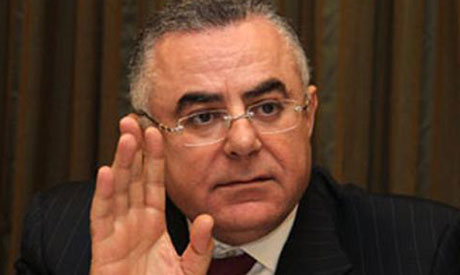 New Central Bank of Egypt (CBE) Governor Hisham Ramez outlined his vision for Egypt's economic future in his first televised interview on Sunday evening.
New Central Bank of Egypt (CBE) Governor Hisham Ramez outlined his vision for Egypt's economic future in his first televised interview on Sunday evening.
"Egypt's economy needs crisis management," Ramez told talk show host Lamis El-Hadidi by way of explaining a series of new measures to be implemented by Egyptian banks in the coming period.
One such measure, said Ramez, designed to halt the ongoing erosion of foreign currency reserves, is for banks to prioritise vital imports of basic foodstuffs, medicine, production machines and spare parts, and fertilisers. The CBE also plans to exempt importers of basic commodities from a previous compulsory requirement to place collateral – 50 percent of the transaction's value – in a local bank.
Egypt's foreign reserves dwindled to $13.6 billion as of the end of last month, barely enough to cover three months of national imports.
Asked about the dangers of dollarization, Ramez said that current levels of household dollarization were far from what he would consider "critical." He added that raising interest rates on three-year certificates of deposit at state banks was one of the measures that could reduce local demand for US currency.
For the long term, the governor voiced optimism.
"There were times in the 1990s when Egypt did not even have [forex] reserves," he said. "Reserves are easy to accumulate once you have stability and a clear economic programme, and when foreign investment returns and local investors feel confident."
Achieving broad political consensus on economic reforms – upon which a proposed $4.8 billion IMF loan are conditional – will be key to resolving Egypt's economic woes, according to the CBE governor.
"There must be a political and social consensus on the reforms; the public must understand that such reforms are imperative," insisted Ramez. He added that the government could only resume loan talks with the IMF once it had the blessing of all political parties – and society at large – to be able to implement the economic reforms upon which the loan was conditional.
Egypt had been close to sealing the deal on the high-profile loan deal last December before it was postponed at the government's request. Talks with the IMF were halted after President Morsi passed a raft of tax hikes (which were part of the economic reform programme presented to the IMF), which he soon reversed in the face of political and popular opposition.
Ramez explained that the IMF loan would "unlock" other loans and attract foreign investment, adding that the reason cited for recent credit downgrades was the risk that Egypt might fail to secure the loan.
That said, the reforms were necessary in themselves for the long-term viability of Egypt's economy, the governor stressed. He went on to point out that there were measures within the reform package designed to ease their impact – such as the lifting of subsidies – on the general public.
Ramez added that banks under his mandate would support vital sectors – such as tourism, manufacturing and exports – and encourage small and medium enterprises.
On the impact of recent bank rating downgrades, Ramez asserted that the fact that Egypt's external funding was limited would ease the blow.
Asked by El-Hadidi about the $10,000 limit on foreign currency allowed in and out of the country, Ramez stated that he thought the law was unreasonable, saying that he had asked for it to be repealed.
The CBE governor concluded by saying that 2013 was a "crossroads" for Egypt's economic future, stressing that success would depend on political consensus and popular support for needed reforms.



